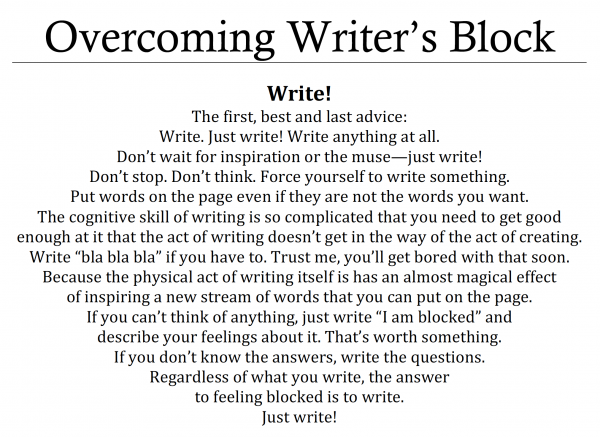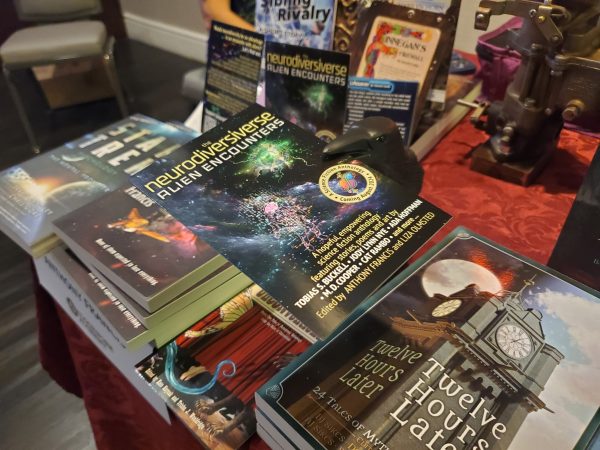
So one thing here to remind myself to blog about it in more details - I attended a panel at the Nebulas on "Moving Beyond Milford" which was very useful. Milford, for those not steeped in writerly inside baseball, refers to the Milford Writer's Workshop, or, more generally, a critiquing model in which a group gets together, shares stories to read in advance, and everyone critiques each other.
The key element of Milford is that each person in the group gets their turn to critique - say, four minutes - during which nobody else can speak - not the other authors, not other group members, with the exception of a facilitator who can keep things on track. And most people seem to agree that the gag rule is critical to Milford in that it helps authors to learn to take criticism - and shuts up "that guy" so he doesn't dominate the critique.
But it can cause people to pile on, or for criticism to be repetitive, or even misplaced. So people were recommending different approaches - online, threaded critique, or structured critique where you had to start off with what resonated with you in the story before critiquing it, or encouraging facilitated discussion so everyone doesn't pile on with dittos.
I had "office hours" at the Nebulas, during which I advised other authors on problems - not because I'm some super experienced author or anything, but simply because I'm an editor and publisher, which means authors who are arguably equally or more experienced than me thought they might benefit from talking to an editor and publisher about specific problems. Which we did, with a couple of people.
And, when I did, I took the advice of the "Moving Beyond Milford" panel: I reformulated my critique into a five-point breakdown:
- What did I think the story was about? Reiterating what the story is about ensured that I "got" what the author was trying to do, in an attempt to head off at the pass any misunderstandings.
- What did I like about the story? Identifying what resonated with you about the story helps the author understand what's working about the story which they probably shouldn't change.
- What areas of improvement did I see? This is something that can crush newbie authors - or experienced authors hit with impostor's syndrome - so it's important to formulate this in terms of suggestions.
- What features or turns of phrase stuck with me? These might be small things, but I think highlighting key sentences, elements of description, or ideas are important to remind authors they can be effective.
- What areas could potentially use copyediting? If there are typos, grammatical errors, or other opportunities for low-level textual improvement, highlight them here.
But even though that's what I used when I analyzed the story, that's not how I presented the above material to the author in our meetings. What I did instead was use the following script (after the meet-and-greet):
- Here's what I think I read. I started off by briefly reiterating what I thought the story was about, so the author knew I had read their piece (and we could clear up any misconceptions).
- What do you want help with? I then asked the author to explain what areas they needed help in. If anything about that wasn't clear, I asked them to explain in their own words the problem.
- Let's brainstorm solutions to your problem. Before digging into my notes, we discussed their problem in greater depth and used story structure ideas to start looking for solutions.
- Let's discuss where my notes intersect with your concerns. Then, we dug into where my notes intersected their problems, focusing on the parts where they needed help.
- Once we have ideas about a solution, then share the other notes. Where the other notes were still relevant, I shared them, trying to build suggestions about how to make the story stronger.
Overall, I wanted to not dive in with how I thought the story could be better, but to improve the author's experience working with the story first, then focus on how my thoughts about the story could help them.
I think this is a better approach than tackling the story proper as an entity divorced from its author. Once a story is done, we can talk about the text as an entity independent of its author, but BEFORE the story is done, it's a work in process being worked on by a real human being, asking for help.
When critiquing, put helping the author first, and worry about your personal pet peeves some other time.
-the Centaur
Pictured: Some writing advice from me, from back in the day, while blog image uploading is down.




